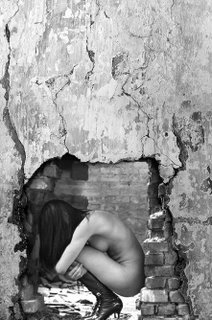 The don't ask, don't tell policy toward Israel's nuclear-weapons program emerged from negotiations between US president Richard Nixon and Israeli prime minister Golda Meir - the same prime minister who also denied the existence of the Palestinian people.
The don't ask, don't tell policy toward Israel's nuclear-weapons program emerged from negotiations between US president Richard Nixon and Israeli prime minister Golda Meir - the same prime minister who also denied the existence of the Palestinian people.John F Kennedy was the only US president to demand greater accountability of Israel, a nation that has consistently refused to sign the nuclear Non-Proliferation Treaty (NPT), which would subject the country to inspections by the International Atomic Energy Agency.
Talk to average Iranians these days and they are full of such facts. Why, they want to know, is Iran being singled out by the United States when they are surrounded by far worse offenders whom no one confronts? Iran is, after all, a signatory to the NPT, which permits member states to pursue peaceful uses of nuclear technology, as Iran's government claims it's doing.
At a time when Iran's foray into nuclear-power development has come under the international microscope, with the assumption that the "mad mullahs" are busying themselves to get the bomb, Pakistan has thus far avoided such scrutiny, despite the fact that it's an unstable military regime that could easily turn from a nuclear-armed US ally to a nuclear-armed enemy in the time it takes to say "coup d'etat". And what about India? Like Pakistan and Israel, it has a nuclear arsenal and refuses to sign on to the NPT. Yet India is being rewarded for this behavior by US assistance with its civilian nuclear program, an act that is undermining non-proliferation efforts and the treaty itself.
All but forgotten are the provisions of the NPT that require current nuclear states to begin dismantling and liquidating their own weapons system. Instead, the US has begun developing new-generation nukes, violating the very treaty it claims to be defending and potentially setting the stage for another nuclear arms race.
In the case of Iran, the stark double standards of US foreign policy have become more pronounced than usual, and potentially more dangerous to global security. Since 2002 - long before the election of Iran's current president whose scruffy beard, sunken cheeks and provocative outbursts against Israel have all the hallmarks of a villain straight from central casting - Iran was already marked as a member of the "axis of evil". This was at a time when its president was the gentle reformist-philosopher Mohammad Khatami, who pressed for an international "dialogue of civilizations" in hopes that it might melt the long-standing Iran-US cold war and mitigate rising tensions between Islamic nations and the West.
Khatami's overtures were largely ignored. As the elected president of Iran, he was portrayed in the West as a mere figurehead who lacked any real power over the direction of the nation. It's a view that seems more contradictory than ever as the new president, Mahmud Ahmadinejad, is being portrayed as the all-powerful leader of Iran, when in fact he is subject to the same limitations as his predecessor. The same political system, two opposing interpretations from the White House.
A similar about-face can be observed in the case of Iran's original attempts to develop its nuclear capacity in the late 1970s. Iran was then led by Mohammad Reza Shah Pahlavi, the dictator whom the US had placed in power after its Central Intelligence Agency overthrew Iran's democratically elected prime minister, Mohammad Mossadegh, who had moved to nationalize Iran's oil.
Iran has been the country to benefit most from the war in Iraq. Today it is awash in petrodollars thanks to skyrocketing oil prices that are another side-effect of the Iraq war. (One can only imagine the massive amounts of fuel the war effort itself has consumed, irrespective of the ongoing damage to oil pipelines by insurgents, for everything from Humvees, tanks and aircraft to the never-ending supply lines transporting meals, water, soldiers, ammo and absolutely everything else into the country). And Iran has been able to sit back and watch its two arch-enemies - the Taliban in Afghanistan and Saddam Hussein in Iraq - be defeated by the United States.
Yet the situation is not exactly comforting for Iran. Today it is surrounded by a nuclear-armed Pakistan, US-occupied Afghanistan and Iraq, and a nuclear-armed Israel that did not hesitate to bomb Iraq's Osirak nuclear reactor in 1981, despite subsequent condemnation from the United Nations. (It was the lesson of Osirak that led Iran to distribute its nuclear program at various points around the country, in many cases burying it deep underground, so as not to provide an easy target should history repeat itself.)
And Iran's leadership understands that the main issue in the minds of US military planners and their Israeli counterparts is not nuclear proliferation, but regime change. To back down or show weakness, they believe, is political suicide.
Excerpts From An Article By Deborah Campbell
No comments:
Post a Comment